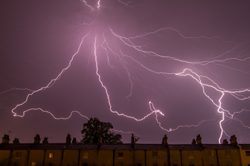 You’ve likely heard the expression ‘act of God’, usually in reference to insurance claims. But what’s the difference between it and force majeure, and under what circumstances does either apply?
You’ve likely heard the expression ‘act of God’, usually in reference to insurance claims. But what’s the difference between it and force majeure, and under what circumstances does either apply?
Acts of God
Acts of God are usually referred to with regard to insurance and typically include natural phenomena such as floods, lightning strikes, hurricanes, tornadoes and earthquakes. Any large-scale, freak weather occurrence falls under this category.
The term is used by insurers and legal professionals to describe events that can’t be predicted or prevented by reasonable measures, and is often used to protect insurance companies from the large payouts associated with such events. As insurance rates are based on calculated risks, and as acts of God don’t tend to be calculable, they aren’t considered a standard risk. When it comes to insurance policies, act of God clauses are applied in extreme circumstances.
Anyone who’s buying an insurance policy should ask for clarification on what it covers in this regard, as the definition can differ amongst insurance companies. Therefore, you must be aware of what is considered an act of God under your particular policy, particularly in circumstances such as owning a home that’s on a flood plain.
Force Majeure
While the term ‘force majeure’ bears some similarity to an act of God, it’s typically applied in commercial agreements rather than insurance claims. Force majeure clauses usually state that one or more parties are not liable for a delay in performance or outright non-performance in certain extraordinary circumstances.
A force majeure clause in a contract is intended to address what is beyond the reasonable control of the people entering into it, in case they’re prevented from doing their duty by a circumstance they can’t plan for, prevent or avoid.
What force majeure doesn’t cover are delays resulting from negligence or malfeasance of a party that have an adverse effect on that party’s ability to perform its obligations. It also doesn’t indemnify contracted parties against the natural consequences of external forces or any circumstances that have been specifically laid out within the contract.
Instead, force majeure is often drafted into time-sensitive contracts to offer protection when a party fails to take reasonable precautions that will prevent or limit the effects of outside interference, whether such interference is likely or actually occurring.
Force Majeure in English Law
Did you know that force majeure isn’t automatically applied in English law? If you want to protect yourself against the types of situations described above, you’ll have to specifically state it when you’re writing out a contract.
Force majeure is actually far more extensively used in English law than acts of God, and there are situations where something not considered an act of God might be classified as force majeure. Interestingly, however, it can’t be used to cover delays against bad weather, football matches or funerals!
Notable Uses
In international law, force majeure is typically applied to significant, unpredictable events that result in declaring a state of emergency. In other circumstances, such clauses protect businesses in situations that have prevented them from delivering on a promise despite working to the best of their ability.
For example, in Singapore, a 2011 refinery fire caused Shell Singapore to declare force majeure after the disaster left the company unable to provide diesel fuel. Failing to include this wording in its contracts would have resulted in massive liabilities for the corporation for breaching its contract.
Other examples have included outbreaks of swine flu, the foot-and-mouth disease epidemic, and even volcanic ash from Iceland that halted air travel and prevented some companies from delivering products and services or individuals from doing their jobs. In these circumstances, a wide variety of companies, such as airlines, must rely on force majeure clauses to protect themselves from liabilities they couldn’t prevent.
There are many situations where force majeure or acts of God may come into play, from small delays to catastrophic international events. Understanding the difference can help you determine how to protect yourself, your home or even your company.
If this article has piqued your interest in learning more about the law of obligations (which includes contract and tort as covered here), you may well be interested to note that The Institute of Legal Secretaries and PAs covers these subjects in standalone courses and through its full Diploma course.

